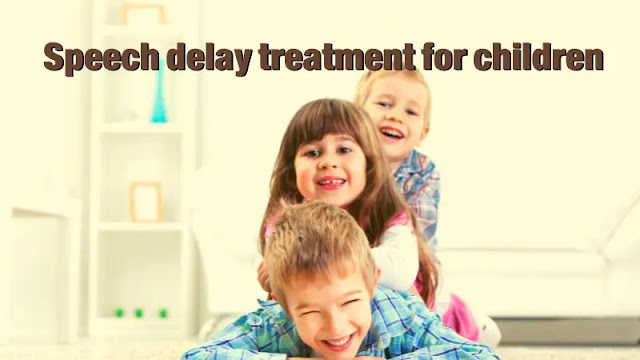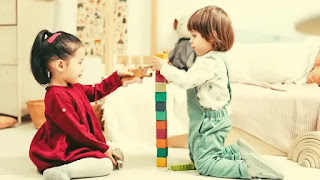Does your child have a speech delay, do not worry, it does not always mean that something is wrong, as the delay in speech can also be due to a hearing loss, a neurodevelopmental disorder or an essential one. In this topic, we will talk about the treatment of delayed speech in children.
Does your child suffer from a delay in speaking?
Your child may have a language delay, and developmental milestones help assess your child's progress, but these are only general guidelines as children develop at their own pace.
Delayed speech in 3-year-olds does not necessarily mean that there is something wrong, as it can be due to several other factors that can be effectively treated.
What is the speech delay in 3-year-olds?
Speech and language skills begin to calm the infant, and over the months, mindless babbling becomes the first word he understands.
Speech delay in 3-year-olds is what happens when a child does not meet typical speech milestones, ensuring that a small delay in conversation does not necessarily mean there is a serious problem, and - the old can:
- Use approximately 1,000 words.
- They call each other by name and they call others by name.
- They use nouns, adjectives, and verbs in sentences of three or four words.
- plural.
- Ask questions.
- Tell a story, repeat the rhyme, sing a song.
Signs of delayed speech in 3-year-olds
There are several signs of delayed speech in 3-year-olds. If a child is fussy or making other sounds within two months, this could be the first sign of delayed speech. By the age of 18 months, most children can use simple words such as "mom" or "mother." Dada, and one of the signs of delayed speech in children is ..
- Age 2: Do not use at least 25 words.
- Age 2 1/2: Does not use two-word sentences or combinations of verbs.
- 3 years old: Doesn't use at least 200 words, doesn't ask for things by name, and is hard to understand even if you live with them.
- All ages: Unable to pronounce words that have already been learned.
What can cause delayed speech in 3-year-olds?
Speech delay can mean their schedule is a little different and will catch up, but delayed speech or language can tell us more about their general physical and intellectual development, here are some examples.
1- problems in the mouth
Delayed speech in children can indicate a problem with the mouth, tongue, or palate, in a condition called "tongue bonding," where the tongue connects to the floor of the mouth. Tongue-tie can also make breastfeeding difficult.
2- Speech and language disorders
A 3-year-old can understand and communicate in a non-verbal way but cannot say many words may be delayed in speaking, and a person who can say a few words but cannot form them in intelligible sentences may be delayed in language.
Some speech and language disorders involve brain function and may indicate a learning disability, and one cause of speech, language, and other developmental delays is premature birth.
Speechlessness in children is a physical disorder that makes it difficult to form sounds in the correct order to form words. It does not affect nonverbal communication or language comprehension.
3- Hearing impairment
A child who does not hear well or hears slurred speech is likely to have difficulty forming words.
One sign of hearing impairment is that your child does not recognize a person or thing when you name it, but does recognize it if you use gestures.
However, signs of hearing impairment can be very subtle, and in some cases a speech or language delay may be the only indication.
4- Lack of motivation
Learn to talk to get into the conversation, and it's hard to keep talking if no one is interacting with you.
The environment plays an important role in the development of speech and language, and neglect or lack of verbal encouragement can keep a child from developing.
5- Delayed speech in children and autism
Speech and language problems are often seen with autism, and other signs may include:
- Repeat instructions instead of creating instructions.
- repetitive behaviours.
- Poor verbal and nonverbal communication.
- Impaired social interaction.
- Regression of speech and language.
- Neurological problems.
6- Intellectual disability
Speech delay in 3-year-olds can be due to a developmental disability, and if your child is not speaking, it may be a cognitive problem rather than an inability to form words.
Speech delay therapy for 3-year-olds
There are many causes of delayed speech as well, so treatment depends on the cause, and treatment of delayed speech in 3-year-olds may include the following.
1- Speech therapy
Speech therapy is the first line of treatment for speech delay in 3-year-olds, and if speech is the only developmental delay, this may be the only treatment needed.
Speech therapy can also be effective as part of an overall treatment plan when there is another diagnosis, and the speech-language pathologist will work directly with your child and advise you on how to help.
2- Early intervention services
Speech delays can also lead to behavioral and social problems, and with a doctor's diagnosis, your 3-year-old may be eligible for early intervention services before school starts.
3- Treating the underlying disease
When the speech delay is associated with an underlying condition or occurs with a co-occurring disorder, it is also important to address these issues, which may include:
- Help for hearing problems.
- Correcting physical problems in the mouth or tongue.
- practice therapy.
- Physical therapy.
- Applied Behavioral Analytical Therapy.
- Management of neurological disorders.
What parents can do
Here are some ways to encourage your child to talk:
- Talk directly to your child, even if it's just listing what you're doing.
- Use gestures and point at objects while saying the matching words. You can do this using body parts, people, toys, colors, or objects that you see while walking.
- Read to your child and talk about the pictures on the go.
- Speak light and easy song words with repetition.
- Be more attentive when you talk to her and be patient when your child tries to talk to you.
- When someone asks a question, you don't answer it.
- Even if you anticipate their needs, give them the opportunity to speak for themselves.
- Revise the words correctly with him instead of directly scolding him and criticizing mistakes.
- Let your child deal with children who have good pronunciation skills.
- Ask questions and make choices, giving you plenty of time to answer.
What to do if you think your child may be late
In order to ensure the health of your child, we have already talked about methods of permanent treatment for stomach worms, and at the conclusion of our topic we talked about the treatment of speech delay for children. 3-year-olds, “It may be good that nothing is wrong, but in some cases a delay in speech may indicate other things, and problems, such as poor hearing or slow growth.
When this is the case, it is a good idea to intervene early, and if the child is not talking, make an appointment with the pediatrician.
I wish you and your children a healthy and good life.



Comments
Post a Comment